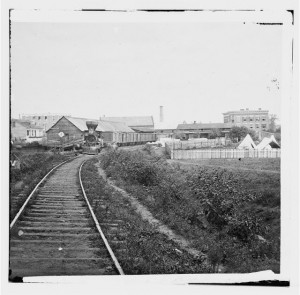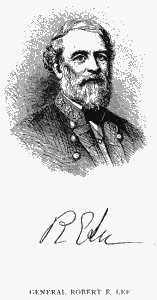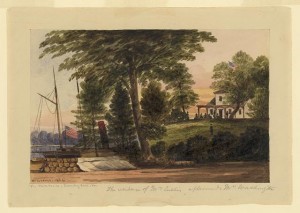Adviser Lee’s First General Order
In early March 1862 Jefferson Davis recalled Robert E. Lee from the South Carolina area to Richmond to serve as the president’s military adviser. At the time the Richmond Daily Dispatch hailed Davis’ decision – Lee’s caution was like Washington’s caution and could turn out to be advantageous; he did a great job fortifying the more southern coast and it would be good to have all the armies under one “commander-in-chief”.
Presumably the following is the first of General Lee’s orders in his adviser job. Lee is trying to make sure the railroad are less dangerously chaotic. Apparently military commanders were not coordinating with a railroad’s Supervisor.
From the Richmond Daily Dispatch March 27, 1862:
A Sensible order.
The order we publish below will commend itself to every reflecting person. It is well known that it is necessary to have the utmost system in the management of railroads, to promote the safety of persons and the maximum efficiency of the machinery. To the Superintendent, who is best acquainted with the movement of the trains, the condition of the rolling stock and road, the grades, length of turnouts, and capacity of the several water stations, and to him alone, the subordinate officers look for orders; and when such orders are interfered with or countermanded by military officers, we are sure the interests of the Confederacy must suffer. Where the transportation is so great as it has been during the war, it is impossible to effect it without the best system, and any interference, however good the intentions, may, and probably will, prevent such system from being carried out. Whenever, as in this order, the whole responsibility rests on the Superintendent, we may confidently say, all that can be done towards expediting Government demands, with the facilities at hand, will be. This order leaves the military men to do the fighting, and the Superintendents alone to do the running, in which capacity we are sure they will each do their part well. Like all other orders emanating from its source, it is excellent, and will no doubt give universal satisfaction to the railroad officers throughout the Confederacy.
Headquarters, Richmond, Va.,
March 20, 1862.
General Orders, No. 1.
To avoid the danger, if not the certainty, of frequent collisions, and the consequent destruction of life and property, as well as obstruction to all transportation, it is absolutely necessary that the movements of railroad trains should be under one undecided control. These considerations make it imperative that all trains should be regulated in their movements and speed only by their conductors and engineers, in accordance with the regulations and time-tables of the company. All the operations of a road should be controlled by its Superintendent, or other authorized officer, and all orders for transportation of every kind, and the movement of every train, will be directed through him, when the exigencies of the service demand a variation from the regular schedule. Disregard of this rule will inevitably be attended with disastrous consequences.
By order of
Gen. R. E. Lee.
W. H. Taylor, Asst. Adj. Gen.
The March 27th Dispatch issue also alludes to a more recent and more immediately urgent general order. General Order No. 16 cancels all furloughs and leaves of absence. The Union advance makes it imperative that all soldiers get back to their units.
On March 14, 1862 General Lee wrote a letter to his wife (living at the White House plantation on the Pamunkey River) in which he expresses concern about the Yankee advances and foresees that he might not be at his desk job in Richmond for too long:
How long it will be practicable for you an[d?] Charlotte to remain there I cannot say. The enemy is pushing us back in all directions, and how far he will be successful depends much upon our efforts and the mercy of Providence. I shall, in all human probability, soon have to take the field, so for the present I think things had better remain as they are. Write me your views. If you think it best for you to come to Richmond I can soon make arrangements for your comfort and shall be very glad of your company and presence.
Disunion has a good piece that looks at the relationship between Davis and Lee.



